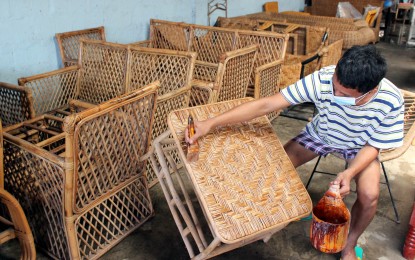
NATIVE FURNITURE. An artisan applies varnish on a rattan coffee table to give it a glossy shine and to protect it against the elements in this undated photo. The Forest Products Research and Development Institute has been tapped to help address health and safety concerns arising from locally-made furniture, particularly those in key government facilities. (PNA file photo)
LOS BAÑOS, Laguna – The Department of Science and Technology (DOST), through its Forest Products Research and Development Institute (FPRDI), is leveraging local innovations to avoid a repeat of an incident wherein wooden furniture at the Ninoy Aquino International Airport (NAIA) was found to be infested with bed bugs.
In an interview on Tuesday, FPRDI officer-in-charge Rico Cabangon said his agency has been tapped to help address health and safety concerns arising from locally-made furniture, particularly those in key government facilities such as airports.
Cabangon said there are available technologies and methods to prolong the service life of non-timber forest products (NTFPs), and his office will be applying these technologies to preserve furniture and woodwork in select facilities.
“Like any lignocellulosic materials, rattan furniture and handicrafts are prone to attacks of biodeterioration agents. Proper maintenance is key to using indigenous materials like rattan,” he said.
Cabangon shared that rattan is one of the leading raw materials used in furniture and handicraft products that is often combined with metals and wood to enhance its aesthetic appeal.
Bed bugs are attracted to the woven pattern furniture and thrive in items with tiny cracks and crevices, he added.
Likewise, rattan furniture can be infested with biodeterioration agents such as fungi, termites and powder-post beetles or "bukbok".
Cabangon said they have studied various methods to protect NTFPs against biodeterioration agents from processing, storage and transit.
He said chemical and non-chemical control methods may be used such as application of wood preservatives to freshly cut and conditioned materials, and achievement of low moisture content through kiln drying.
Meanwhile, the institute is currently researching eco-friendly ways to safeguard wood and NTFPs such as thermal modification to use high heat to change the kind of chemicals in a piece of wood.
Cabangon is also recommending minimizing exposure of treated materials to prolonged wetting to extend their service life.
He underscored that DOST Scientist Juanito Jimenez found that this method makes the material more durable as it becomes more stable, more weatherproof and less prone to swelling and shrinking and less appetizing to termites.
Cabangon is urging the public to support the local furniture industry showcasing Filipino ingenuity in different places in the country.
“Through science, technology, and innovation, we can continue to take pleasure in bug-free Filipino craftsmanship,” Cabangon said.
DOST-FPRDI’s laboratory, headquartered in Laguna, was established in response to the need for information and technology on the utilization of timber resources as well as non-wood forest products. (PNA)
